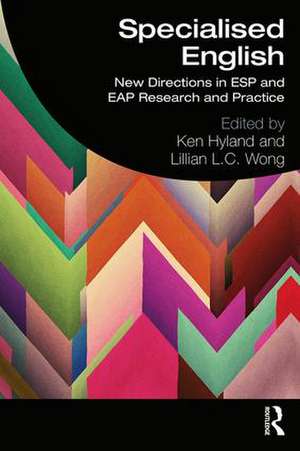Specialised English: New Directions in ESP and EAP Research and Practice
Editat de Ken Hyland, Lillian L C Wongen Limba Engleză Paperback – 8 apr 2019
- Offers a clear and accessible introduction to current issues in EAP and ESP, including academic interaction, academic lingua franca, second language publishing, workplace talk, practitioner identity, data-driven learning and critical thinking
- Includes studies of a range of genres such as research articles and student reports, student spontaneous speech, personal statements, builders’ diaries and university tutorials
- Presents links between theory and practice with a sampling of different research methodologies, practical applications and theoretical approaches
| Toate formatele și edițiile | Preț | Express |
|---|---|---|
| Paperback (1) | 397.59 lei 6-8 săpt. | |
| Taylor & Francis – 8 apr 2019 | 397.59 lei 6-8 săpt. | |
| Hardback (1) | 1003.26 lei 6-8 săpt. | |
| Taylor & Francis – 9 apr 2019 | 1003.26 lei 6-8 săpt. |
Preț: 397.59 lei
Nou
Puncte Express: 596
Preț estimativ în valută:
76.08€ • 79.43$ • 62.96£
76.08€ • 79.43$ • 62.96£
Carte tipărită la comandă
Livrare economică 05-19 aprilie
Preluare comenzi: 021 569.72.76
Specificații
ISBN-13: 9781138588776
ISBN-10: 1138588776
Pagini: 274
Ilustrații: 14 Line drawings, black and white; 14 Halftones, black and white; 26 Tables, black and white; 28 Illustrations, black and white
Dimensiuni: 156 x 234 x 18 mm
Greutate: 0.64 kg
Ediția:1
Editura: Taylor & Francis
Colecția Routledge
Locul publicării:Oxford, United Kingdom
ISBN-10: 1138588776
Pagini: 274
Ilustrații: 14 Line drawings, black and white; 14 Halftones, black and white; 26 Tables, black and white; 28 Illustrations, black and white
Dimensiuni: 156 x 234 x 18 mm
Greutate: 0.64 kg
Ediția:1
Editura: Taylor & Francis
Colecția Routledge
Locul publicării:Oxford, United Kingdom
Public țintă
Postgraduate and UndergraduateCuprins
Preface Brian Paltridge
Introduction Ken Hyland and Lillian L. C. Wong
Section one: Conceptual issues in specialised language use
1. Academically speaking: English as the Lingua Franca Anna Mauranen
2. What do we mean by ‘Workplace English’? A syllabus framework for course design and assessment Jane Lockwood
3.Genre as interdiscursive performance in English for Professional Communication Vijay K. Bhatia
4. Power in English for Academic Purposes John Flowerdew
5. EAP practitioner identity Alex Ding
Section two: Focus on texts
6. English as a Lingua Franca and Learner English in Disciplinary Writing: A corpus perspective Lynne Flowerdew
7. Academic interaction: Where’s it all going? Ken Hyland
8. Exploring critical thinking in academic and professional writing: A genre-based approach Ian Bruce
9. Vocabulary in university tutorials and laboratories: Corpora and word lists Averil Coxhead and Thi Ngoc Yen Dang
10. Researching the impact of ‘the culture order’ in professional workplace contexts Janet Holmes
11. Multimodal student texts: Implications for ESP Jean Parkinson
Section three: Focus on practice
12. Grappling with the personal statement: Transformation, appropriation, and externalization Ann M. Johns
13. Tools and strategies for Data-Driven Learning (DDL) in the EAP writing classroom Laurence Anthony
14. Implementing disciplinary data-driven learning for postgraduate thesis writing LillianL. C. Wong
15. Academic writing feedback: Collaboration between subject and EAP specialists Jill Northcott
16. Directives in academic writing tutorials: How do different teaching styles affect their use? Ursula Wingate and Eva Ogiermann
17. Seeking supervisor collaboration in a School of Sciences at a Chinese university Yongyan Li and Margaret Cargill
Index
Introduction Ken Hyland and Lillian L. C. Wong
Section one: Conceptual issues in specialised language use
1. Academically speaking: English as the Lingua Franca Anna Mauranen
2. What do we mean by ‘Workplace English’? A syllabus framework for course design and assessment Jane Lockwood
3.Genre as interdiscursive performance in English for Professional Communication Vijay K. Bhatia
4. Power in English for Academic Purposes John Flowerdew
5. EAP practitioner identity Alex Ding
Section two: Focus on texts
6. English as a Lingua Franca and Learner English in Disciplinary Writing: A corpus perspective Lynne Flowerdew
7. Academic interaction: Where’s it all going? Ken Hyland
8. Exploring critical thinking in academic and professional writing: A genre-based approach Ian Bruce
9. Vocabulary in university tutorials and laboratories: Corpora and word lists Averil Coxhead and Thi Ngoc Yen Dang
10. Researching the impact of ‘the culture order’ in professional workplace contexts Janet Holmes
11. Multimodal student texts: Implications for ESP Jean Parkinson
Section three: Focus on practice
12. Grappling with the personal statement: Transformation, appropriation, and externalization Ann M. Johns
13. Tools and strategies for Data-Driven Learning (DDL) in the EAP writing classroom Laurence Anthony
14. Implementing disciplinary data-driven learning for postgraduate thesis writing LillianL. C. Wong
15. Academic writing feedback: Collaboration between subject and EAP specialists Jill Northcott
16. Directives in academic writing tutorials: How do different teaching styles affect their use? Ursula Wingate and Eva Ogiermann
17. Seeking supervisor collaboration in a School of Sciences at a Chinese university Yongyan Li and Margaret Cargill
Index
Notă biografică
Ken Hyland is Professor of Applied Linguistics in Education at the University of East Anglia. He is a Foundation Fellow of the Hong Kong Academy of the Humanities and an Honorary Professor at Warwick University, Jilin University and Hong Kong University.
Lillian L. C. Wong is a Senior Lecturer in the Centre for Applied English Studies at the University of Hong Kong. She researches innovation and change in English language education, EAP and ESP, and has extensive experience developing, teaching and coordinating undergraduate, postgraduate and teacher education programmes.
Lillian L. C. Wong is a Senior Lecturer in the Centre for Applied English Studies at the University of Hong Kong. She researches innovation and change in English language education, EAP and ESP, and has extensive experience developing, teaching and coordinating undergraduate, postgraduate and teacher education programmes.
Descriere
This book provides an authoritative and cutting-edge account of the latest avenues of research and practice in the dynamic field of Specialised English.
